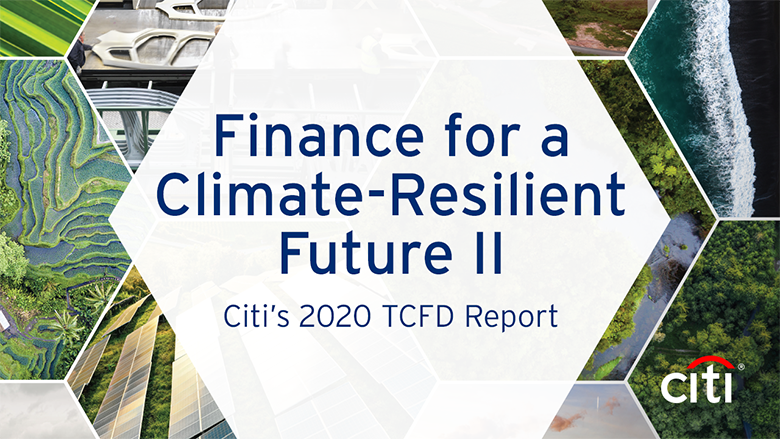2020 TCFD Report: Our Climate Risk Disclosure
As the world's most global bank, Citi must play an important role in addressing the climate crisis and financing the transition to a low-carbon economy. A key aspect of enabling this transition is understanding and disclosing the potential impacts of our business on the climate, as well as the potential impacts of climate change on our business.
Today, Citi released our 2020 climate disclosure report, highlighting our progress in implementing the recommendations of the Task Force on Climate-related Financial Disclosures (TCFD). The TCFD recommendations are an important framework that guides our work in identifying, managing, and disclosing the risks and opportunities associated with climate change. This work also highlights the relationship between climate change and systemic risk, and how acting responsibly in line with public interests can mitigate risk.
Since the TCFD recommendations were first issued in 2017, the urgency of addressing climate change has continued to accelerate. 2019 was the second warmest year on record, and in 2020, we experienced devastating wildfire seasons in Australia and the West Coast of the U.S., and one of the most active hurricane seasons in the Atlantic.
We began reporting on our climate risk assessment in 2018, establishing our leadership as the first U.S. bank to release a TCFD report. Since then, we have been integrating climate risk awareness into our business activities and overall strategy, corporate governance and risk management. This year, we took steps to further integrate climate into our businesses, forming new sustainability-focused teams including a Sustainability and Corporate Transitions team in Banking, Capital Markets and Advisory, and an ESG team in Markets and Securities Services.
We made climate risk assessment a key pillar of our 2025 Sustainable Progress Strategy announced this summer, and we're continuing to focus on testing the resilience of our lending portfolios to transition risks and physical risks related to climate change. In addition to embedding this work across Citi, we're also ramping up our industry collaboration to adopt new methodologies to analyze the climate risk associated with our client portfolios – such as the Paris Agreement Capital Transition Assessment (PACTA) and the Partnership for Carbon Accounting Financials (PCAF) – and we will share updates on this work next year in our annual ESG Report.
I'm proud of the progress we've made so far. Some of the highlights in this TCFD report include:
- Enhanced cross-functional collaboration on climate issues, and expanded climate change governance and oversight, in line with increasing climate regulatory requirements;
- Further integration of climate risk within our Risk Management frameworks, and the strengthening of fossil fuel sector standards in our Environmental and Social Risk Management Policy;
- Additional scenario analysis for our oil and gas exploration and production portfolio, to better understand short-term impacts and our clients' resilience to a rapidly instituted carbon price;
- Physical and transition risk assessment of Citibanamex's commercial real estate and agriculture portfolios; and
- Physical risk assessment of our own facilities to test the climate resilience of our operations.
Looking ahead, we know there's much more to do as we continue our work to decarbonize our business and support the low-carbon transition. Achieving this kind of macroeconomic change will require a unique combination of analysis, data, partnership, and innovation, as well as durable climate policy. This latest TCFD disclosure is a part of our commitment to accelerate our assessment and understanding of the climate risks faced by Citi and our clients. Our ability to improve our analysis of climate-related risks, however, also relies on our clients continuing to improve their own climate-related reporting. We can't do this alone, and it's critical that we all continue to work together and take concrete steps towards a more sustainable and climate-resilient future.
To hear more about our work, check out the latest episode of POLITICO's Global Translations podcast, where we're in conversation with Mindy Lubber, President of Ceres.
